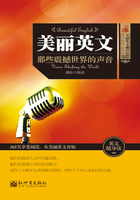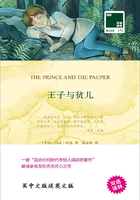在失物招领处
中西文化
近年来,出国旅游已经越来越流行。但是第一次出国旅游的游客可要当心,万一遗失物品,不要惊慌,去失物招领处登记就好了。大多数情况下,失物招领处会帮你找到你遗失的物品。
典型对话
1.捡 到 钱 包
A:What can I do for you?
A:我能为你做什么?
B:I found this bag in the street. I guess it's lost. Could you find its owner?
B:我在街上捡到一个钱包。我想是谁丢了钱包。你能帮忙找到失主吗?
A:We'll try our best.
A:我们会尽力的。
2.钱 包 丢 失 登 记
A:May I help you?
A:有什么可以帮您的?
B:My purse was lost. May I have it registered?
B:我的钱包丢了。我可以登记一下吗?
A:Sure. Could you fill out the lost property form?
A:当然。你能填一下失物单吗?
B:OK.
B:可以。
A:Make sure you've written everything clearly.
A:请确定每一项都填写清楚。
B:I see.
B:我明白了。
3.认 领 背 包 (1)
A:Good morning.
A:早上好。
B:Good morning. I'm informed that my bag was found by someone. Could I get it back now?
B:早上好。听说有人找到了我的包。我能拿回来吗?
A:OK. Before you get it back, could you describe it?
A:好的。在您领回去之前,请您描述一下您的包?
B:It's a black leather bag with a red flower on the cover. There're two books and an umbrella in it.
B:是一只黑色皮制包,上面有一朵红色的花。包里面有两本书和一把伞。
A:What's the name of the books?
A:书名是什么?
B:One is mathematics; the other is a comic book. The umbrella is yellow.
B:一本是数学,另一本是一本漫画书。伞是黄色的。
4.认 领 背 包 (2)
A:Oh! It's really my bag!Thank you very much!
A:哦,这真的是我的包!非常感谢!
B:Our pleasure.
B:不客气。
A:By the way, could I know who found my bag and brought it here? I'd like to give my personal appreciation to her or him.
A:顺便问一下,我能知道是谁找到它并把它送来的吗?我想向她或他当面致谢。
B:OK, let me check. Sorry, there is no name registered here.
B:好的,我查一下。对不起,没有留名字。
A:Oh, what a pity!
A:哦,很可惜。
5.未 找 到 遗 失 物 品
A:I'm sorry. We've checked our Lost and Found list but I'm afraid your purse didn't appear on the list.
A:对不起。我们已经检查过我们的失物招领单,但是恐怕上面没有您的钱包。
B:Thank you for your help.
B:谢谢你的帮忙。
A:Would you please fill out the lost property form? So we can contact you if it's located.
A:您能填一下失物招领单吗?如果有人捡到了,我们可以联系您。
B:Thanks.
B:谢谢。
6.遗 失 护 照
A:Excuse me, could you help me?
A:对不起,能不能帮我一个忙?
B:Yes? What seems to be the problem?
B:好的。有什么问题吗?
A:Well, I was wondering if anyone has turned in a passport.
A:我想知道是否有人交来一本护照。
B:I'm afraid not. Have you lost your passport?
B:恐怕没有。你遗失了护照?
A:I think so. I can't find it anywhere in my hotel room, and I remember the last place I used it yesterday was in this department store.
A:我想是的。我在饭店的房间里都找不到护照。我记得昨天最后用护照的地方是在这家百货公司。
B:Where exactly did you use your passport in the store?
B:你在百货公司什么确切的地方用过护照呢?
A:In the suit dress department. I had to show it to pay for these dresses with my traveler's checks.
A:在女装销售部。我用信用卡买衣服的时候必须给他们看护照。
B:Well, let me call the suit dress department to see if they've found a passport.
(A minute later)
B:这样的话,我打电话给该部门,看看他们有没有捡到护照。
(一分钟之后)
B:Sorry. Your passport's not been turned there, either.
B:对不起。你的护照也没被交到那边。
A:Then what shall I do?
A:那我该怎么办呢?
B:You can fill in this lost property report, and I'll keep my eye out for it. Those kinds of things usually turn up eventually, but I suggest you contact your embassy and tell them about your situation, so they can issue you a new passport in case it doesn't show up.
B:你来填这张遗失报告表,我会替你留意的。像这样的东西,最后总是会出现的。但我建议你跟你们的大使馆联系并把你的情形告诉他们。万一你的护照找不到的话,他们会给你补发新护照的。
Encountering a Bad Guy遇上坏人
中西文化
中国人出国旅行喜欢携带大量现金。因此,很多罪犯喜欢盯着中国旅客下手。 所以,不要把所有的现金都带在身上,也不要都放在一个地方。但是,身上也要留些钱,因为有时强盗抢不到钱会把人痛揍一顿。
典型对话
1.遭 遇 抢 劫 (1)
A:Freeze or I'll shoot!
A:不许动!否则我要开枪了。
B:What's up, sir? Is this a mistake? I'm just a student. I don't have much cash on me.
B:出什么事了,先生?是不是有什么误会?我只是一个学生。我身上没有太多现金。
A:Nonsense. I want money and all the valuable things.
A:别废话!我要钱和所有值钱的东西。
B:Here you are. Please don't shoot me!
B:给你。请你不要开枪。
2.遭 遇 抢 劫 (2)
A:Hands up!
A:举起手来!
B:What do you want?
B:你想要什么?
A:Shut up! Put your hands up! No noise! Where is the money?
A:闭嘴!举起手来!不准喊!钱在哪里?
B:My wallet is in the left hand pocket of my coat.
B:我的钱包在大衣的左手边的口袋里。
A:Hand out the key to the car!
A:把车钥匙交出来。
B:In the right hand pocket.
B:在右手边的口袋里。
3.抢劫求助
A:Help!
A:救命啊!
B:What's the trouble, Madam?
B:出什么事了,夫人?
A:I was attacked by a young man who came at me from nowhere. He snatched my bag off my hands and ran away.
A:我被一个不知从哪里来的年轻人给袭击了。他从我手上抢走了我的包,然后逃走了。
B:What did the young man look like?
B:那个年轻人长得什么样?
A:Well, he is young, tall and with long hair.
A:嗯,他很年轻,长得很高,留着长头发。
B:OK.
B:好的。
4.被人袭击
A:I want to report a case, policeman. I was attacked by a blackman from behind.
A:我想报案,警察。我被一个黑人从后面袭击了。
B:Did you have any loss?
B:你有丢东西吗?
A:Yes, my bag was gone and my necklace too.
A:是的,我的包丢了,我的项链也没了。
B:Did you have an impression what the man looks like?
B:你有印象那个黑人长什么样吗?
A:I didn't catch his appearance. He was wearing a mask.
A:我没看清他的长相。他带着一个面具。
5.抢劫报警
A:This is 911.Can I help you?
A:911报警中心。出什么事了?
B:There is an emergency here. A man snatched a lady's purse and ran away.
B:这里有突发事件。一个男人抢走了一位小姐的包逃走了。
A:Where did the crime occur?
A:案件发生在哪里?
B:In central park.
B:在中央公园。
A:When does the assailant look like?
A:罪犯长什么样?
B:He is tall, wearing a blue jacket.
B:他很高,穿了一件蓝夹克。
Asking the Police for Help求助警察
中西文化
美国联邦调查局是美国唯一的全国性的警署机构。美国警察局是市或地方一级单位。警察局局长这一职务是选举产生的。每个州对违章和执法概念的理解不是相同的,在一个州是合法行为可能在别的州就是违法行为哦。
典型对话
1.钱 包 丢 失 报 警
A:Excuse me. I have lost my purse. Can you tell me what I should do?
A:打扰一下。我的钱包丢了。你能告诉我怎么办吗?
B:Well, do you have any idea where you lost it?
B:恩,你知道是在哪里丢的?
A:No, I don't remember at all.
A:不,我一点也不记得了。
B:Then, I suggest you go to the nearest police station to report the loss.
B:那我建议你去最近的警察局报案。
A:Could you tell me where the police station is?
A:你能告诉我警察局在哪儿吗?
B:There is one at the corner.
B:在街角就有一家。
2.到 警 察 局 认 领 钱 包
A:Good evening. I was told my purse was found and been handed here.
A:晚上好。听说我的钱包找到了并且被送到这里来了。
B:May I ask your name?
B:您贵姓?
A:Mary Green.
A:玛丽·格林。
B:Can you describe your purse?
B:你能描述一下你的钱包吗?
A:It's a red leather purse with red zip.
A:是一只红色的带红色拉链的皮制钱包。
B:Could you tell me the contents of the purse?
B:你能告诉我里面有什么吗?
A:Two credit cards, 100 dollars and my passport.
A:两张信用卡,100元钱,还有我的护照。
3.遗 失 背 包 报 警
A:Excuse me, my bag is lost. What can I do?
A:打扰一下,我的包丢了。我该怎么办呢?
B:Please calm down! And where did you lose it?
B:请冷静!你在哪里丢了?
A:On a taxi whose number is B22457.
A:在一个出租车上,车牌号是B22457。
B:Tell me your name and the hotel you're in.
B:把您的名字和您下榻的酒店告诉我。
4.房 间 被 盗 报 警
A:Hello, I'm a tourist from China. I want to report a burglary.
A:你好!我是从中国来的游客。我想报告一起入室行窃案。
B:Your name and your passport number, please.
B:请问您的名字和护照号码?
A:Wang Ming. My passport number is 9034569021.
A:王明。我的护照号码是9034569021。
B:OK. What's the matter?
B:好的。出什么事了?
A:I just came back to find my room burgled.
A:我回来时发现我的房间被盗了。
B:Your address.
B:你的地址。
A:Room 212, Hilton Hotel.
A:希尔顿酒店,房间212。
Being Injured and Bing Sick受伤生病
中西文化
在出国旅游之前,医生一般会建议注射疫苗。此外,医生也建议出国旅行的人最好随身携带存放重要药品的小药箱,以便在有需要时可派上用场。必须携带的药物有:药布、纱布、剪刀、消毒及抗细菌药膏,以便割伤或擦破皮肤时可用;伸缩绷带,在扭伤时可用;测量体温的温度计;防晒油;镇痛药片,头痛、发烧及中暑时均可用;抗酸剂;治疗泻肚子和食物改变引起的轻微便秘的药丸;伤风感冒时用的减充血剂;抗痒药物;预防晕车药物。
在国外就医费用相当昂贵,因此应当参加健康保险。出门在外难免出现小的不适,要依据个人的情况随身携带点常用药,以备不时之需。
看望外国病人要注意以下几点:
(1)宜送鲜花、书刊、唱片、贺卡等物品,而不要送食品、水果、补剂、保健品等。
(2)不要打听病情。
(3)不要建议病人多喝水、多吃水果、注意穿衣等。
(4)一般要表示希望其早日康复。“I hope you get well soon” 和 “Take good of yourself” 是最适用、最保险的用语。
典型对话
1.晕 车 (1)
A:Bob, how much longer do you think this bus ride will take?
A:鲍勃,你知道车子还要开多久啊?
B:I don't know. I'm ready to get off the bus too. This has been a really bumpy ride.
B:我不知道。不过我也想下车,这一路上太颠了。
A:I know. I suppose it's because we're in the mountains.
A:是啊。我想这是在山上行驶的缘故吧。
B:Are you OK? You look kind of pale.
B:你怎么样?看上去脸色有点苍白。
A:I don't feel very well. I think it's carsickness.
A:我觉得有点难受。我想我是晕车了。
B:Are you feeling really sick?
B:你不行了吗?
A:I don't know. I feel really bad.
A:不知道。我感觉非常不好。
B:Here, do you want to sit by the window? Let's change the seat. Maybe fresh air will help.
B:要不要坐到靠窗的位子?跟你换个位子。新鲜空气也许会让你觉得好一些。
A:Hope so. Yes, a little better. But I still feel sick.
A:但愿如此。好一点了。不过还是很难受。
B:Master, how much longer will this ride take?
B:师傅,车子还要开多久啊?
C:It will take us 3 more hours to get out of the mountain, and then an hour or so to get to our destination.
C:还要三个多小时才能下山,然后再过一个多小时才能到目的地。
A:Oh, my! I don't know if I can make it that long.
A:天啊!我恐怕坚持不了那么久。
2.晕 车 (2)
A:Do you have any carsickness medicine, Bob?
A:鲍勃,你带了晕车药没有?
B:Do you think it would work? I think it's too late for that. You should have taken it 30 minutes before we started off. Take this pickled plum and keep it in mouth. It may help, as many Chinese people say.
B:你觉得会有用吗?我想现在吃已经太晚了。你应该在开车前30分钟吃药。把这颗话梅含在嘴里。许多中国人都说有用。
A:Oh, I feel terribly sick. Move out of the way. I need to get to the bathroom!
A:哦,我难受死了。让一让,我要去洗手间!
C:Lady, can I help you? I have a special method to relieve motion sickness.
C:女士,我来帮你一下吧。我有特别的办法对付晕车。
A:Really? I find it hard to believe. But I'd like to try it since I'm feeling so bad.
A:是吗?我不太相信。不过试试吧,我实在太难受了。
C:Give me your left hand. You may feel a bit puffy first. And then you will feel a bit relaxed. Now give me your right hand.
C:把左手给我。开始你会有些胀感,然后就会觉得轻松一些的。好,换右手。
A:Dear me! My arm's aching all over! Be soft, please! Wow, it's gone! The sickness is gone! I'm feeling much relaxed now!That's really extraordinary! Thank you, friend. Thank you very much!
A:哎呀,整个手臂都酸!请你轻一点!咦,不晕了!我不晕了!轻松多了。真难以想象!谢谢你。朋友,太谢谢了!
3.车 祸 受 伤
A:Oh, God! The driver's going to get us killed. Slow down, you guy!
A:天啊?司机会把我们撞死的!开慢点,你这家伙!
B:Oh! You're going to hit that car!
(Crash!)
B:啊,你差点就要撞上那辆车了!
(撞车)
C:Now look what you made me do!
C:看看,你们都让我干了些什么!
B:Anne, are you OK?
B:安妮,你没事吧?
A:No, I can't move my leg. It hurts.
A:我的腿动不了了。疼死了。
B:You can't move your leg? This is seri ous. You guy take us to a nearby hospital right now. I told you to take us to the hospital immediately. You hear me?
B:腿动不了了?这严重了。你这家伙马上把我们送到附近的医院去。我要你立即把我们送到医院去,听到了没有?
C:You have to pay extra money!
C:你们得另外加钱!
A:Nonsense! I will call 911.
A:胡说!我要打911。
4.开 快 车
A:The driver is going too fast. I wish he'd slow down.
A:司机开得太快了。我真希望他能开慢一点。
B:I know. This seems a little dangerous. I guess he drives 80 miles at least.
B:是的。这样有点危险。我估计他至少开80码。
A:Hey, sir. Can you slow down? You're speeding! There's a speed limit sign on the roadside. It is too dangerous!
A:嘿, 先生, 你开慢一点好吗?你在超速开车呢。路边不是有限速标志吗?太危险了!
C:Don't worry! There will be no problem!
C:别担心! 没有问题的。
A:Oh, God! Please slow down. Or I will call the police.
A:哦,天哪! 请慢速行驶!否则我要叫警察了!
5.食 物 中 毒 (1)
A:Are you OK, Bob? You've been in the bathroom for almost half an hour. What's wrong with you?
A:鲍勃,你没事吧?你在厕所里呆了差不多半个小时了。你怎么了?
B:Oh, David, I don't feel well. My stomach is upset and I feel like vomiting and having diarrhea.
B:哦,我觉得不太舒服,戴维。我的胃有点不舒服,想要呕吐,又想拉肚子。
A:You haven't eaten anything bad, have you?
A:你有没有吃什么不干净的东西啊?
B:Well, I went to a Japanese restaurant with my tourist guide this evening.
B:对了,我今晚和我的导游去了一家日本餐厅。
A:What did you eat there?
A:在那儿吃了些什么?
B:Shusi, a soup and some raw fish slices with mustard. My guide told me that Japanese like this kind of food.
B:寿司,一碗汤,一些生鱼片加芥末。我导游说日本人喜欢吃这些东西。
A:Oh, our Americans are not used to raw food. I think you should take some pills.
A:哦,我们西方人吃不惯这种生的东西。我想你应该吃点药。
6.食 物 中 毒 (2)
A:Hey, Bob, what's wrong with you? Why are you lying on the couch?
A:嘿,鲍勃,你怎么啦?为什么你躺在沙发上?
B:I've had diarrhea five times after the dinner. I thought I had eaten something wrong.
B:我晚饭后已经拉了5次了。我想我肯定吃了不干净的东西。
A:Do you want to go and see a doctor?
A:你想去看医生吗?
B:Not now. I took medicine with me. I'm going to take some and see if it helps.
B:现在不想。我带了药。我先吃两片看看是否有效。
A:OK. If you need me, just call me. I'm in room 234.
A:好的。假如你需要我的话,就给我打电话。我在房间234。
7.孩 子 割 伤
A:Get some help, please.
A:请叫人来帮忙。
B:What happened?
B:怎么了?
A:My baby cut himself with a knife, and he is bleeding badly.
A:我的宝宝被刀割了个口子,现在血也止不住。
B:I think I can help stop the bleeding, but youshould call the doctor.
B:我想我能够帮助止血。可你还是应该给医生打个电话。
A:Ok. Is that Doctor Lee speaking?
A:好的。请问是李医生吗?
C:Yes. Who is that speaking?
C:是的,你是哪位?
A:This is Mary. My baby cut himself with a knife. We are trying to stop the bleeding. What should we do after that?
A:我是玛丽。我的宝宝被刀割了个口子。我们正在尽力给他止血。然后我们应该怎么办啊?
C:Keep him quiet. I will go there right now.
C:让他别乱动。我马上就到你那儿。
A:Thanks a lot.
A:非常感谢。
8.脚 踝 扭 伤
A:What's wrong with you?
A:您怎么了?
B:I sprained my ankle this morning. And it's terribly painful.
B:今天上午我把脚踝扭伤了,疼得很厉害。
A:Well, let me see. It's a bit swollen. No fracture, fortunately. It's not so serious as it seems.
A:让我看看,有点肿。幸运的是,没有骨折,不像看起来那么严重。
B:Do you think I can continue my tour?
B:你认为我能继续旅行吗?
A:If I were you, I would stay in bed for some days.
A:如果是我,我会卧床休息几天。
B:What a lousy luck!
B:真倒霉!
9.感 冒 发 烧
A:What's the matter?
A:怎么了?
B:I feel dull.
B:我觉得精神不振。
A:Do you have any appetite?
A:你有食欲吗?
B:Not too much. I think I have a fever.
B:不太有。我想我发烧了。
A:Let me see your throat. I'll examine your temperature.
A:让我看看你的喉咙,然后我来检查你的体温。
10.感 冒 头 痛
A:I've got a sore throat and my chest hurts.
A:我的嗓子痛,胸也痛。
B:How long have you been like this?
B:这种症状有多长时间了?
A:Two or three days.
A:两三天了。
B:Do you have a headache?
B:头痛吗?
A:Yes, I do. And I sneeze a lot.
A:头痛,还老打喷嚏。
B: (After taking his temperature) You have got a cold. Here is the preion for you.
B: (量了体温后)你得了感冒了。这是你的药方。
11.头 晕
A:Mr. Smith, don't you feel well? You're looking rather pale. What's up with you? Do you have a temperature?
A:史密斯先生,你不舒服吗?你看起来面色苍白,出什么事儿啦? 你发烧吗?
B:No, but I feel dizzy. I'm not feeling very well these days. I'll describe to you the symptoms of my illness.
B:没有,就是有点头晕。这些天来我觉得不大舒服,我把症状给你说说。
A:Maybe you're tired after the journey.
A:你的病可能是旅途过度疲劳引起的。
B:It's very likely.
B:也许是吧。
12.感 冒 咳 嗽
A:My whole body feels weak. In fact, I'm in aches and pains all over.
A:我浑身没劲,全身到处都疼。
B:Shall I accompany you to the hospital?
B:我陪你去医院治疗一下好吗?
A:All right. Please call a taxi for me.
A:好的,请要一辆出租汽车。
B:Here is a glass of water for you to take the medicine.
B:这杯温开水是给你吃药的。
A:Thank you. You have rendered me excellent service indeed. We feel more at home in China.
A:你对我的照顾真是无微不至。在中国我们感到很温暖。
B:You are welcome.(Two days later)
B:不客气。(两天后)
B:Are you better, sir?
B:先生,你今天感觉好点了吗?
A:I feel much better today. But I still have a cough.
A:我今天好多了,但还有点咳嗽。
B:Please take a good rest and I hope you'll get well soon.
B:希望你好好休息,早日恢复健康!
13.预 约 医 生 (1)
A:Will Dr.Terry be able to see me tomorrow?
A:明天特里大夫能给我看病吗?
B:Sorry, he's got a rather full day tomorrow.
B:抱歉,明天他一整天都排满了。
A:How about Tuesday?
A:星期二怎么样?
B:Tuesday is not good. I'm afraid he's busy at that time, too.
B:恐怕星期二也不行,他抽不出时间。
A:Can you make it some other time?
A:你能安排在其他时间吗?
B:Yes, I can. How about 9:00 Wednesday?
B:可以,星期三上午9点怎么样?
A:Well, I'll be there in time.
A:好的,我按时去。
14.预 约 医 生 (2)
A:Do you think Dr.York could see me tomorrow before 10:00?
A:明天10点以前约克大夫能给我看病吗?
B:I'm afraid not before midday.
B:中午以前恐怕不行。
A:Is 12:30 any good?
A:12点半行吗?
B:Sorry again, but I'll ring if somebody cancels.
B:再次抱歉,不过如果有人取消了预约,我会打电话通知你的。
A:How about 1:30 p.m.?
A:下午1点半怎么样?
B:Yes, he's free then. You'll be here on time.
B:可以,那时他有空,你得准时到这里。
15.流 感
A:What seems to be the trouble?
A:哪里不舒服?
B:I've got a sore throat, and my chest hurts.
B:我喉咙痛,且胸口也不好受。
A:How long have you been like this?
A:像这样多长时间了?
B:Two or three days.
B:有两三天了。
A:I'd think you have got flu.
A:我看你是患了流行性感冒。
B:What should I do?
B:我该怎么办?
A:Take this preion to the drug store and then go straight to bed.
A:拿此处方到药店买药,然后立即卧床休息。
16.胃 疼
A:What's the matter with you?
A:你哪儿不好受?
B:I'm feeling shivery and I've got a pain in my stomach.
B:我感到发冷且胃疼。
A:How is your appetite?
A:胃口如何?
B:I don't have any appetite.
B:我食欲不佳。
A:How long have you been this way?
A:这样有多久了?
B:It came on yesterday.
B:从昨天开始的。
A:By the sound of it, you have caught a chill.
A:根据听诊,你是着凉了。
B:What do you advise?
B:你说我该怎么办?
A:I'll give you some medicine for it and come to see you in a couple of days.
A:我给你一些药去吃,过两天我去看看你。
17.头 晕
A:What's wrong with you?
A:哪里有病?
B:I keep feeling dizzy and I've got a headache.
B:我一直感到头晕且伴有头痛。
A:Have you got a fever?
A:你发烧吗?
B:No, I haven't.
B:不发烧。
A:How long has this been going on?
A:这样持续多久了?
B:Two days.
B:两天了。
A:Are you taking any medication now?
A:你正在服什么药吗?
B:I'm taking the pain killer.
B:我正在服止疼片。
A:I'd say you have generally run down.
A:我看你是劳累过度了。
B:What do you think I'd do?
B:你看我如何是好?
A:It's nothing serious, but you'd better stay in bed for a day or two.
A:不要紧,但你最好卧床休息一两天。
18.发 烧 呕 吐
A:What's the matter?
A:哪里不好受?
B:I'm running a temperature and I feel sick.
B:我正在发烧,还想呕吐。
A:Do you have a headache?
A:你的头疼吗?
B:Yes, it's a little better than this morning, but it still aches.
B:疼,比早上好一点,但还疼。
A:Since when have you been feeling like this?
A:从什么时间起有这样的感觉?
B:It all started the day before yesterday.
B:从前天突然开始的。
A:Is this the first time you have had this?
A:这是你第一次得这种病吗?
B:No, two years ago I had this one.
B:不是,两年前我得过这种病。
A:You seem to have picked up some sort of infection.
A:你似乎染上了什么传染病。
B:What ought I to do?
B:我该怎么办?
A:You don't worry. I'll give you a preion.
A:你不必担心,我给你开个处方。
19.看 牙 医
A:What's the matter with your tooth?
A:你的牙哪儿不好?
B:I have a broken tooth.
B:我有颗烂牙 。
A:Where is it?
A:在什么位置?
B:It's at the top of left.
B:在左上部。
A:Do you want it extracted?
A:你想拔掉吗?
B:Yes.
B:想拔掉。
A:Open your mouth widely.
A:张大你的嘴。
B:Yes, I do.
B:好的。
A:OK. Is this the bad one?
A:好了,是这颗坏牙吗?
B:Wow. It's my denture.
B:哇!这颗是我的假牙。
A:Oh, terrible sorry, it should be at your left instead of mine.
A:啊!实在是太抱歉了,应当是在你的左边,而不是在我的左边。
20.药 店 配 药
A:The doctor gave me this preion. Can you make it up for me?
A:医生开给我的这张处方,你这儿能配上这些药吗?
B:I'll only take ten minutes, so perhaps you'll wait.
B:只要10分钟就配好了,也许你要等一会儿。
A:How often must I take it?
A:我该多长时间吃一次药?
B:Three times a day, a half hour after meals.
B:一日3次,饭后半小时服用。
A:And how often am I supposed to take this pill?
A:这种药丸我该多长时间服用一次?
B:Take one pill a day with a glass of water.
B:每日1丸,用水送服。
21.嘴 唇 肿 痛
A:Can you give me something suitable for sore lips?
A:你能给我配一些治嘴唇肿的药吗?
B:Try this cream. I think you'll find it'll do the trick.
B:试试这种乳膏。我看你用了就会好的。
A:Have you got something for style?
A:有治麦粒肿的药吗?
B:Yes, rub this cream every four hours.
B:有,涂这种药膏,每隔4小时涂一次。
22.气 管 炎
A:What's wrong with you?
A:哪里不舒服?
B:I've got a bad cough and there's an ache in my chest.
B:我咳嗽得很厉害,胸口痛。
A: (After examination) You've got bronchitis.
A: (检查后)你得了气管炎。
B:Oh, is it serious?
B:哦,很严重吗?
A:No, but you've got to be careful about it. Are you allergic to penicillin?
A:不严重,但你得当心点儿。你对青霉素过敏吗?
B:No, usually not.
B:不,平常不会过敏。
A:Then you'll have an injection.
A:那就给你打一针吧。
Running out of Money手头拮据
中西文化
根据我国现行的外汇管理法令规定,在中华人民共和国境内,禁止外币流通,并不能以外币计价结算。为了方便来华旅游的外宾和港澳台同胞用款,中国银行及其他外汇指定银行除受理外币旅行支票、外国信用卡兑换人民币的业务外,还受理22种外币现钞和台湾新台币的兑换业务。目前,可在中国代办的外国信用卡主要有:万事达卡(Master Card)、维萨卡(Vise Card)、运通卡(American Express Card)、JCB卡和大莱卡(Diners Card)等。
典型对话
1.旅 游 途 中 借 钱
A:Bob, I'm calling from Hong Kong. I need your help.
A:鲍勃,我从香港给你打电话。我需要你的帮助。
B:Is it Anne? Why? What's the problem? It's the middle of the night.
B:你是安妮吗?怎么啦?发生了什么事?现在是深更半夜了。
A:Well, Rose and I are in Hong Kong and we don't have any money on hand.
A:罗斯和我现在在香港,我们身边一点钱都没有了。
B:Why didn't you bring more money?
B:那为什么不多带一点呢?
A:I thought Rose was bringing extra cash and she thought I was bringing it. We've been shopping and eating out all week, and didn't realize we were out of money until tonight when we didn't have enough money to pay for our dinner.
A:我原想罗斯会多带一些现金,而她以为我会多带。我们一个星期都在外面吃饭买东西,一点也没想到钱会不够,一直到今天晚上我们吃饭付不了账了才知道。
B:You didn't have enough money for dinner? Oh, poor Anne!
B:你们甚至没有钱付账?哦,可怜的安妮。
A:No. It was really embarrassing. And what's worse, we couldn't leave the restaurant.
A:我们非常尴尬。更糟糕的是我们不能离开这家饭店。
B:What did you do then?
B:后来怎么了?
A:We had to wash dishes 4 hours for the private restaurant for our dinner. That's why I couldn't call you until now.
A:我们只好在这家私人饭店里为他们洗了四个小时的碗来付清我们的账。这就是为什么我现在才能给你打电话的原因。
B:You washed dishes there? That's incredible!
B:你们在那儿洗碗?真不可想象!
A:That's not the point. We need money. We don't leave until Saturday, but it's only Tuesday. Our hotel's paid for, but we need to eat.
A:那倒没什么关系。我们需要钱。我们要在这儿呆到星期六,今天才不过星期二。旅馆的钱我们已经付了,但是还要吃饭啊。
B:What do you want me to do?
B:你要我做点什么?
A:Could you telegraph some money over?
A:你能给我汇点钱过来吗?
B:OK. Give me your address.
B:没问题。给我你的地址。
2.透 支 信 用 卡
A:I'm afraid we have troubles. We have run out of money.
A:恐怕我们有麻烦了。我们的钱花光了。
B:Don't worry. We have credit cards. We can get cash from a cash machine.
B:别担心。我们有信用卡。我们可以在取款机上取钱。
A:I'm afraid not. There is no money on our credit cards.
A:恐怕不行吧。我们的信用卡上没有钱了。
B:That shouldn't be a problem. We need to find a cash machine. It should be able to give us an advance on our account.
B:那应该没有问题。我们去找到一台自动取款机。它应该可以允许我们的账户上有一点透支的。
A:Great! We'll go and find an instant cash machine right now. We need to do some more shopping.
A:太棒了。我们就去找取款机。我们还要买一点东西。
B:All right. Darling!
B:好吧,宝贝。
Car's Breaking Down车辆抛锚
中西文化
由于美国是个多汽车的国家,汽车修理自然而然也成了一个重要的行业,而且在许多城市汽车修理还是个竞争比较激烈的行业。在美国修车的工钱一般是很高的。换一个几块钱的零件收你十几块钱是常有的事。有个别车行为了赚钱,甚至让你修一些本不该修的东西,而需要修的地方却总是修不好。所以说起修车,好多人都有道不完的苦水。这就是为什么很多人一旦找到一个信得过的车行或修理师傅就总是将车送到那儿的原因,这也是为什么美国许多男人懂车,也会修车的原因。
典型对话
1.汽 车 突 然 抛 锚
A:Oh, gosh! The car broke down.
A:哦,糟了!汽车抛锚了。
B:What bad luck!
B:真倒霉!
A:Don't worry, I can repair it.
A:别担心,我会修好的。
2.汽 车 故 障 求 助
A:My car died on me.
A:我的汽车开不动了。
B:Don't worry. Maybe we can find someone to help.
B:别担心。也许我们能找到人来帮助你。
A:OK.
A:好的。
3.车 胎 没 气 (1)
A:The car won't start.
A:汽车发动不起来了。
B:What's wrong? Hurry up! We don't have much time left.
B:怎么了?快点!我们剩的时间不多了。
A:I have got a flat tire.
A:我的一个车胎瘪了。
B:There is a repair shop. Maybe they can help you.
B:那儿有一家维修店。也许他们能帮你。
4.车 胎 没 气 (2)
A:My car tire blew out.
A:我的车胎爆了。
B:We have a spare!
B:我们有备用轮胎!
A:Thank goodness.
A:谢天谢地。
5.寻 找 拖 车 (1)
A:Can I help you?
A:有什么可以为您效劳的吗?
B:Yes, I need a tow truck to tow my car away.
B:是的。我需要拖车把我的车拖走。
A:How far away is the broken car?
A:抛锚的汽车离这儿有多远?
B:The car is 2 miles away.
B:那辆汽车离这儿有两英里。
6.寻 找 拖 车 (2)
A:Do you have any first aid equipment?
A:你们有急救器械吗?
B:Yes. What's matter with you?
B:有。出什么事了?
A:There has been an accident.
A:这儿出事故了。
B:We'll go at once.
B:我们马上去。
A:Can you send a tow truck?
A:你们能派一辆拖车来吗?
B:How come?
B:怎么回事?
A:My car broke down.
A:我的车出毛病了。
B:Yes, we can. Where are you?
B:可以,你在何处?
A:At the Haidian Road.
A:在海淀路。
B:OK, we see.
B:知道了。
7. 汽 车 熄 火
A:The car stalled.
A:车熄火了。
B:Where is it?
B:在哪儿?
A:It is on the express way.
A:在高速公路上。
Car Accident遭遇车祸
中西文化
如果不是很严重的交通事故,大多数人都倾向和气地私下和解。若是报警,最好报警后互相留下资料,然后交给保险公司处理,那样不会浪费太多时间成本及导致道路的占用。意外擦撞后最好保持心平气和并寻求解决方法。尤其是在一切讲理、重法的欧美、新加坡等国家,理性沟通远比大声吵架来得有用,所以学会一些处理此类小纠纷的字句,并保持“理直气壮”的态度一定能让大事化小,小事化无。
典型对话
1.同 学 被 撞
A:There was a car accident at the intersection.
A:十字路口发生了一起车祸。
B:That's really awful!
B:太可怕了!
A:Jimmy was hit by a jeep.
A:吉米被吉普车撞了。
B:Gosh! I'm sorry to hear that.
B:天哪!听到这个坏消息真让人难过。
2.卡 车 相 撞
A:Is there any interesting news in the newspaper?
A:报纸上有什么令人关注的新闻吗?
B:Yes. Two trucks crashed into each other. Five people were killed in the accident.
B:有。两辆卡车撞到一起了。事故中死了五个人。
3.差 点 撞 人
A:I nearly hit that old man.
A:我差点撞上那位老人。
B:That was close! Be more careful next time.
B:好险啊!下次再小心点儿。
4.与 公 交 车 相 撞
A:A bus crashed into my car.
A:一辆公共汽车撞上了我的车。
B:In that case, your car must have been severely damaged.
B:那你的车一定被撞得很惨。
A:My father's car was damaged.
A:是的。我父亲的汽车被撞坏了。
B:How did that happen?
B:怎么会这样呢?
A:I swerved to avoid hitting a pedestrian, but I crashed into a big tree.
A:为了避免撞上一位行人,我来了个急转弯,撞上了一棵大树。
B:Were you injured?
B:你受伤了吗?
A:Luckily, not serious.
A:还好,不太严重。
5.撞 上 行 人
A:What should I do?
A:我该怎么办?
B:What's up?
B:怎么了?
A:I braked as hard as I could, but it wasn't enough to stop me from hitting the little girl in front of my car.
A:我拼命刹车,但还是没能阻止我撞上车前面的小女孩儿。
B:Oh, man! How is she now?
B:噢,天呐!她现在怎么样了?
A:Luckily, not badly hurt.
A:所幸没有伤太重。
6.倒 霉 的 一 天
A:Tom has had bad luck recently.
A:汤姆最近很倒霉。
B:Why do you say that?
B:你为什么那么说?
A:Last Monday on his way to work, he discovered that his car had broken down.
A:上周一,在去上班的路上,他发现自己的车坏了。
B:That is bad luck!
B:确实很倒霉!
A:But those were not worth mentioning compared to the accident.
A:但那些和车祸相比不值一提。
B:Accident? What accident?
B:车祸?什么车祸?
A:He was hit by a truck on his way home that way.
A:他那天在回家的路上被卡车撞了。
B:Oh, bless his heart.
B:噢,愿上帝保佑他。
Emergency Care紧急救护
中西文化
在美国,看病的第一步就是要预约时间,而往往一约就是一两个星期后。负责安排医生日程的是其接待员兼护士。如果你病情复杂,一般来说最好去找你信得过或经人推荐的大夫。你得知道在美国看病,包括看牙医,费用都是很高的。虽然提前很多日子就要约诊,不过如果你病情紧急,也有许多大夫和牙医会设法把你插在约诊之间的。
典型对话
1.有 人 昏 倒
A:Oh, my gosh! That lady collapsed.
A:哦,我的天啊!那位女士昏倒了。
B:Is she still breathing?
B:她还有呼吸吗?
A:Let me see.
A:让我看看。
2.急 召 救 护 车
A:Keep the injured boy quiet.
A:让受伤的男孩儿别乱动。
B:OK. We'd better take him to hospital.
B:好的,我们最好送他去医院。
A:You are right. I'll call an ambulance.
A:你说得对,我去叫救护车。
3.胃 疼 就 医
A:Stay put.
A:躺着别动。
B:But even when I stay still, my stomach hurts badly.
B:可即使我躺着不动,我的胃疼得也很厉害。
4.流 鼻 血 救 治
A:My nose is bleeding again.
A:我又流鼻血了。
B:You should elevate your arm.
B:你应该抬高胳膊。
A:Which arm should I hold up?
A:该抬起哪只胳膊?
B:The left one, because your right nostril is bleeding.
B:你的右鼻孔在流血,因此你应该抬起左胳膊。
5.为 腿 部 止 血
A:How can I stop my leg bleeding?
A:我怎么才能止住腿流血呢?
B:Apply pressure to stop the bleeding.
B:用力下压,把血止住。
A:It works! Thanks.
A:确实有效!谢谢。
6.使 用 急 救 箱
A:Is my son all right?
A:我儿子没事吧?
B:Yeah. He just needs some bandages. Get a first aid kit, please.
B:没事。他只是需要一些绷带。请把急救箱拿过来。
7.被 狗 咬 伤
A:What happened?
A:怎么了?
B:I was bitten by a dog. My legs hurt. I can't walk anymore.
B:我被狗咬了。我腿疼,走不了了。
A:Your injuries are quite severe. We need a stretcher to carry you.
A:你的腿伤得很严重。我们得用担架来抬你。














